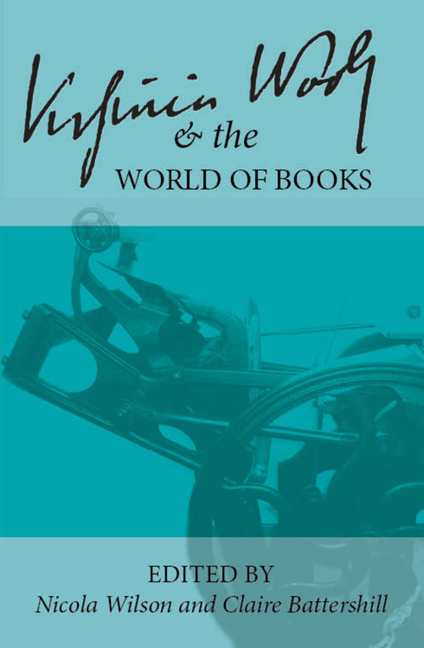 Virginia Woolf and the World of Books
Virginia Woolf and the World of Books Book contents
- Frontmatter
- Contents
- Introduction
- List of Abbreviations
- Keynote
- In the Archives
- Craftsmanship
- The Hogarth Press
- Hours in A Library
- The Art of the Book
- The Art of the Narrative
- Woolf as a Model Builder: Complex Form in the “Ode to Cutbush”
- “Books Were Not in Their Line”: The Material Book and the Deceptive Scene of Reading in To the Lighthouse
- Mrs. Brown and the Trojan Cow: Deconstructing Aristotle in “An Unwritten Novel”
- Making New Books: Creative Approaches
- The Book in the World: Woolf's Global Reception
- Editing and Teaching Woolf
- Intertextuality
- Lives in Writing
- Notes on Contributors
Woolf as a Model Builder: Complex Form in the “Ode to Cutbush”
from The Art of the Narrative
- Frontmatter
- Contents
- Introduction
- List of Abbreviations
- Keynote
- In the Archives
- Craftsmanship
- The Hogarth Press
- Hours in A Library
- The Art of the Book
- The Art of the Narrative
- Woolf as a Model Builder: Complex Form in the “Ode to Cutbush”
- “Books Were Not in Their Line”: The Material Book and the Deceptive Scene of Reading in To the Lighthouse
- Mrs. Brown and the Trojan Cow: Deconstructing Aristotle in “An Unwritten Novel”
- Making New Books: Creative Approaches
- The Book in the World: Woolf's Global Reception
- Editing and Teaching Woolf
- Intertextuality
- Lives in Writing
- Notes on Contributors
Summary
This paper is part of a larger project in which I argue that the recent turn in literary studies toward descriptive, reparative, and post-critical reading should be seen more broadly as a “turn to complexity.” In this essay, I want to argue specifically that the “turn to complexity” should be seen as a “re-turn” to the concerns of the modernist period and the interests of Virginia Woolf. But to get there, I need to do some setup. So, first, what do I mean by “complexity”? I'm using the term in its scientific meaning, as in complex systems theory, which holds that systems must be understood as formed out of small-scale interactions that can't be fully predicted in advance. The classic example is a traffic jam, whose large-scale form emerges unpredictably from the interactions of individual cars and drivers, but any number of systems can be seen as complex, including our own bodies and consciousness, which emerge from small-scale interactions between cells, bacteria, and so forth. Now, how does this connect to literary theory? In my view, works as different as Rita Felski's The Limits of Critique and Caroline Levine's Forms can be read as rallying calls to approach literary texts and literary production as complex systems. For Felski, the problem with “critique” is that it limits our ability to see and engage with literary texts in all their complexity. In deciphering the text as a “symptom, mirror, or index of some larger social structure” (11), we look past the text to invisible structures of control. Yet if we simply look at the text itself, we would find it “jammed thick with implications, connotations, conflicting meaning, and associative echoes that inevitabl[y] exceed any reader's immediate grasp” (66). In Forms, Caroline Levine argues against simplifying formalist criticism that seeks aesthetic unity, insisting instead on the complex interactions and multiplicities of form. She asks, “What if we understood literary texts not as unified but as inevitably plural in their forms—bringing together multiple ordering principles […] in ways that do not and cannot repress their differences?” (40).
A concept that both Felski and Levine employ in explaining how complexity operates in literary texts is that of “affordance.”
- Type
- Chapter
- Information
- Virginia Woolf and the World of BooksSelected Papers from the Twenty-seventh Annual International Conference on Virginia Woolf, pp. 142 - 148Publisher: Liverpool University PressPrint publication year: 2018


